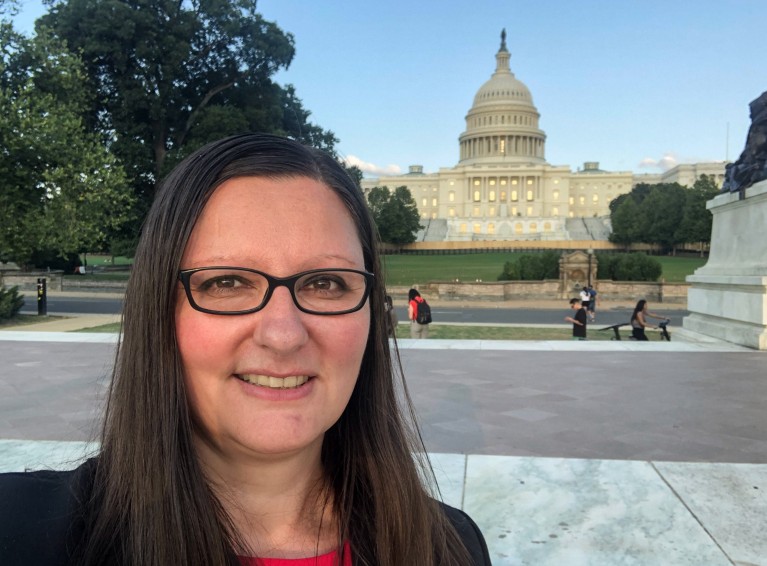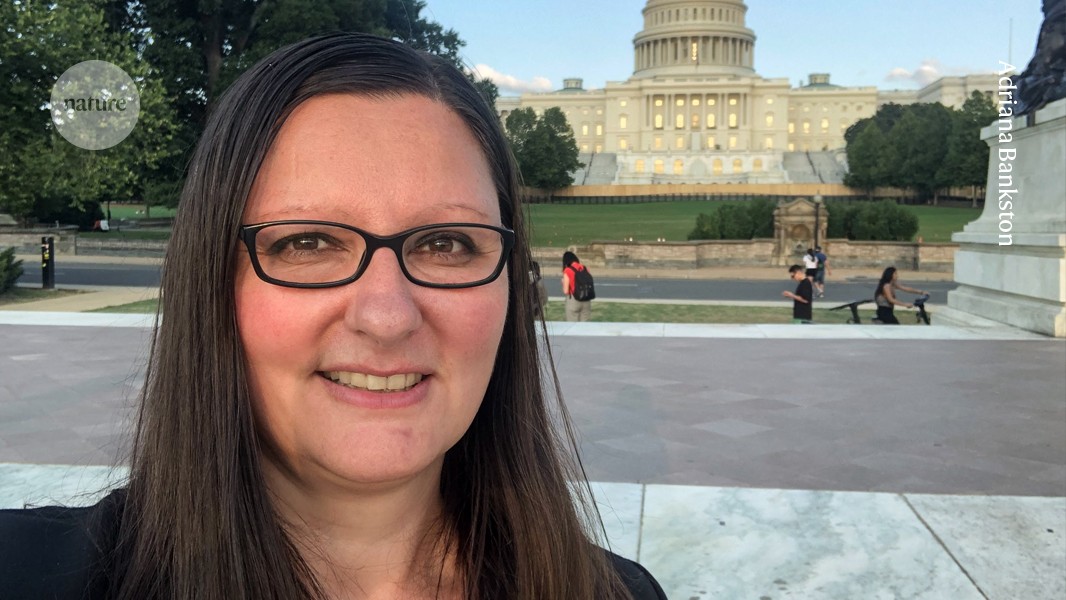
Adriana Bankston at Capitol Hill in Washington DC.Credit: Adriana Bankston
In September 2024, two months before the US presidential election returned Donald Trump to power for a second term, I secured a congressional fellowship to work for Bill Foster, a former physicist who was elected to the House of Representatives as a Democrat for an Illinois district.
The year-long science and technology policy fellowship, based at the US Congress in Washington DC, allows scientists and engineers to learn about and contribute to national policymaking. It is sponsored by the American Society of Gene & Cell Therapy as part of the Science and Technology Policy Fellowships programme of the American Association for the Advancement of Science.
On a typical day, I work on science and research policy, and science, technology, engineering and mathematics (STEM) education, among other topics. This includes defending scientific research and the STEM pipeline — through letters, speeches and legislation — attending meetings with Foster’s constituents, collaborating with other congressional offices that share these interests, and contributing to the advancement of US science at a national level.
Action on salaries
My path into research policy dates back almost a decade, beginning in 2016, when, after a postdoctoral position at the University of Louisville in Kentucky, I joined the non-profit organization Future of Research, based in Pittsfield, Massachusetts.
Our research into postdoc salaries revealed that many fell below US$45,000 a year, although a federal labour law mandated a minimum of $47,476. Postdoctoral salaries increased as a result of our work.
More roles in science advocacy followed, including as a fellow with the Society for Neuroscience, and principal legislative analyst with the University of California’s Office of Federal Governmental Relations, both in Washington DC.
Both roles involved lobbying Congress to increase federal funding for scientific research. I then moved on to helping universities and scientific organizations engage with Congress on science issues, and enabling graduate students and postdoctoral researchers to discuss their work with members of Congress.
Favourite projects
In my current role, four favourite projects spring to mind. The first was reintroducing a resolution to designate 14 March as National Pi Day, which is an opportunity to highlight and recognize the need for investments in mathematics and science education, and getting students interested in STEM subjects.
The second was the Keep STEM Talent Act, which would enable international STEM students to contribute to the workforce and our economy by giving them permanent-resident status.
The third was drafting a speech by Foster from the floor of the House of Representatives, expressing concern with the Trump administration’s cut to the Graduate Research Fellowship Program of the National Science Foundation (NSF). The reduction in funding is preventing outstanding graduate students from pursuing research-based master’s or doctoral degrees in STEM fields.
And finally, I enjoyed writing research talking points for the National Lab Research SLAM, which showcases the contributions to the innovation ecosystem of early-career scientists at the national laboratories — defined as any government-operated or sponsored laboratory.
This year is the 75th anniversary of the NSF. As part of Foster’s team, I contributed to multiple projects defending science funding and federal agencies, and Foster gave a speech from the floor during a Special Order Hour — time set aside for speeches or debates that are not part of the ordinary legislative agenda — which was focused on standing up for science. The speech highlighted how Trump’s proposed budget cuts at the NSF and other science agencies are impairing US competitiveness and the development of the STEM workforce. Along with other members of Congress, Foster introduced a resolution commemorating the NSF’s science and engineering accomplishments over the past 75 years. Our team also initiated and helped to coordinate letters from Congress to the Trump administration expressing concern over the firing of 168 NSF workers, and over the administration’s directive to freeze all NSF grant funding.
Gratification and heartbreak
This has been the most gratifying year of my career so far.
Although I sometimes am heartbroken by what is happening to scientific research in this country, I increasingly find myself encouraged by the resilience of this community to continue fighting for what matters. Being part of this cause is extremely rewarding.
I have heard from scientists, including early-career trainees, about the impacts of cuts to federal science funding. Graduate students and postdoctoral researchers who are just starting out describe feeling uncertain. And those halfway through or close to finishing their degrees are struggling to find the funds to continue their work, and have shared their worries about academic job prospects.
I encourage US scientists to continue talking to Congress, especially to members who care about these issues and have the power to change things. If a scientist is also a constituent of that member of Congress, the connection can go a long way, because members are supposed to listen and work to address the issues. And by participating in national rallies or local demonstrations, researchers can make the case for the importance of science for their communities and the country’s future.


